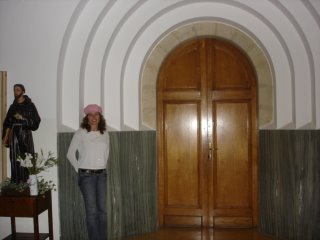


A few days ago I spent the day with an Israeli Arab friend of mine in Jerualem. I'll call her "Samira". I just have to share her perspective because it parallels that of most Israeli Arabs. Psychologists would have a hey-day with Israeli Arabs’ predicament—talk about true identity crisis.
Samira grew up in Nazareth, a primarily Arab (i.e. Palestinian) town, which became part of Israel in 1948. Samira grew up speaking Arabic at home but Hebrew in school. She speaks them both equally well, and says she doesn’t remember a time in her life before she was speaking Hebrew. (I'm a little confused by this, because another friend of mine, a Jewish American living in Tel Aviv, says schools are completely segregated, and Arabs go to their own school, which is taught in Arabic. Maybe Samira went to a private school?)
Samira is Muslim, is fasting for Ramadan, but enjoys beer, does not wear a headscarf and even wears tanktops and strapless tops. On the topic of strapless tops, she relayed what happened to her last week in East Jerusalem (the Arab area). She was wearing a strapless top and driving in the car with her friend. They stopped at a traffic light and a woman in the car next to them motioned for her to roll down her window. She did so, thinking that the woman must know her. When she rolled down the window, the lady spat at her and accused her of betraying Islam. Samira was shocked, saying this had never happened to her before in her life.
Samira lives in a convent in Jerusalem, (yes, a convent!), in a room that she shares with a Palestinian Christian girl. The nuns rent out rooms in the convent as a way to sustain themselves. It's actually a pretty good set-up, located in a fabulous part of Jerusalem, within walking distance to everything. Outside is a beautiful garden, the rooms are moderate size, and the kitchen is clean and spacious. And it's impossible to be late to church, since it's just down the hall! The downsides are that she must be back by 11:00 pm or she's locked out. Also, the girls must keep noise to a minimum, understandably.
Samira navigates between the two different worlds, Jewish and Arab, with remarkable ease--speaking Hebrew at one shop, Arabic in another-- covering her arms with a sweater on one side of town, taking it off in the other. It all appears second nature to her, while to an outsider, it is astounding.
Samira can see the two sides of each issue. For example, terrorism is a real threat, she relates. Her good friend (also Israeli Arab) was killed in a bus that was blown up by Palestinian extremists. Yet, at the same time, she experiences the racism of being a non-Jewish Israeli citizen and says the wall and the occupation are illegal measures that force Palestinians to take such desperate actions.
She described the strange and lonely feeling of being caught between identities. "When I see an Israeli flag, I feel nothing. But also when I see a Palestinian flag, I feel nothing. I am neither." Her Mom tried constantly to impress upon them that they were Palestinians and related the horror stories of what happened to their family in 1948 when they were moved from their village by Israeli forces and many family members killed. Travelling abroad presents unique challenges as well, and for her, she said first presented the occasion for a confused identity. When people ask her where she's from, she would think, "I'm Palestinian", yet have to pull out an Israeli passport. Also, as an Israeli citizen, she can only travel to countries in the region that recognize Israel, i.e. Egypt and Jordan. Yet, as an Arab, she feels that she should be allowed to see other countries.
When I asked her if she would become a citizen of Palestine if it became a state, she said she would, "only if I can enjoy the same freedoms I enjoy now in Israel." I immediately thought was an amazing irony that was. Palestinians in the occupied territories pray daily for their own state and for the end of occupation so they can have even basic freedoms, yet those Arabs living freely in Israel would see a decrease in their personal freedoms.
It's interesting, on that point, I can also see clearly the two sides of the issues. Every time I'm in Tel Aviv, at the beach in my bathing suit, on the ultimate frisbee field in my shorts playing with guys, I literally thank God that I'm from a culture and have access to a culture that does not care in any way what you wear and what you do. As a woman, the feeling is priceless. And yet, I see too that for Palestinians in the territories, they lack freedom on a much more basic level. Who thinks of what to wear or of frolicking at the beach when you can't travel to see your family or are thrown in prison arbitrarily? It's apples and oranges...

No comments:
Post a Comment